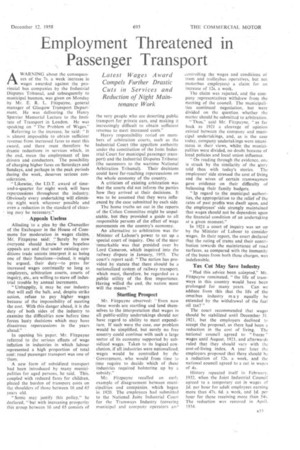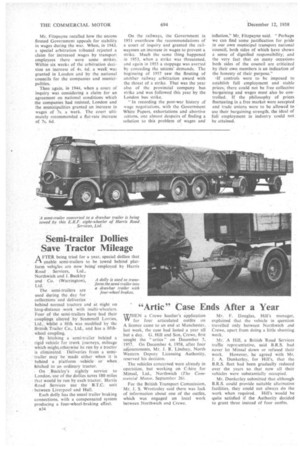Employment Threatened in
Page 67

Page 68

If you've noticed an error in this article please click here to report it so we can fix it.
\ Passenger Transport
Latest Wages Award Compels Further Drastic Cuts in Services and Reduction of Night Main tenance Work
AWARNING about the consequenccs of the 7s. a week increase in wages awarded against the provincial bus companies by the Industrial Disputes Tribunal, and subsequently to municipal busmen, was given on Monday by Mr. E. R. L. Fitzpayne, general manager of Glasgow Transport Depart-ment. He was delivering the Henry Spurrier Memorial Lecture to the Institute of Transport in London. He was speaking on "The Problem of Wages."
Referring to the increase, he said: " it is almost impossible to obtain sufficient revenue from increased fares to meet this award, and there must therefore he drastic reductions in services which, in the end, mean the employment of less drivers and conductors. The possibility of charging higher fares on Saturdays and Sundays, and perhaps in the peak periods during the week, deserves serious con sideration. .
"Likewise, the I.D.T. award of timeand-a-quarter for night work will have repercussions throughout the industry. Obviously every undertaking will eliminate night work wherever possible and even a reduction in the standard of clean' ing may be necessary."
Appeals Useless Alluding to a plea by the Chancellor of the Exchequer in the House of Commonsfor moderation in wages claims. Mr. Fitzpayne said '.! Surely by now everyone should know how hopeless appeals are and that-under existing conditions trade unions interpret it aS being one of their TunctiOns----indeed, it might be argued, their duty—to press for increased. wages continually so long as employers, arbitration courts, courts of inquiry, etc., are willing to stave off industrial trouble by annual increments.
"Unhappily, it may be our industry that will call the halt, and, despite strike action, refuse to pay higher wages because of the impossibility of meeting the cost. With this danger ahead, it is the duty of both sides of the industry to examine the difficulties now before time forces hasty decisions which may have disastrous repercussions in the years ahead."
In opening his paper, Mr. Fitzpayne referred to the serious effects of wage inflation in industries in which labour .represented a high proportion of total cost: road passenger transport was one of
• them. .
A new form of subsidized transport had been introduced by many municipalities for aged persons, he said. This, coupled with reduced fares for children, placed the burden of transport costs on the shoulders of those between 16 and 65 years old.
"Some may justify this policy," he declared, "but with increasing prosperity this group between 16 and 65 consists of the very people who are deserting public transport for private cars, and making it increasingly difficult to obtain sufficient revenue to meet increased costs."
Heavy responsibility rested on members of arbitration courts. such as the Industrial Court (the appellate authority under the constitution of the Joint Industrial Court for municipal passenger transport) and the Industrial Disputes Tribunal (the successors to the wartime National Arbitration Tribunal). Their decisions could have far-reaching repercussions on the whole economy of the country.
A criticism of existing arbitration was that the courts did not inform the parties .how they arrived at their decisions. It was to be assumed that they were influ.enced by the case submitted by each side.
The home truths set out in the reports. of the Cohen Committee might be unpalatable, but they provided a guide to all responsible persons of the effect of wage movements on the country's economy.
An alternative ,to arbitration was the Minister of. Labour's power to set up. a special court of inquiry. One of the Most 'remarkable was that presided over by Lord Cameron, which inquired into the railway dispute in January, 1955. The court's report said: "The nation has provided by statute that there should be a nationalized system of railway transport. Which must, therefore, be regarded as a public utility of the first importance. Having willed . the end, the nation must will the means."
Startling Prospect
Mr. Fitzpayne observed: "Even now these words.are startling and lend themselves to the interpretation that wages in all public-utility undertakings should not have regard to ability to meet expenditure. If such were the case, our problem would be simplified, but surely no free country could continue with such a large sector of its economy supported by subsidized wages. Taken to its logical conclusion, if all industries were nationalized, wages would be controlled by the Government, who would from time to time require to decide which of these industries required bolstering up by a subsidy."
Mr. Fitzpayne recalled an early example of disagreement between municipalities and companies, which began in 1920. The employees had submitted to the National Joint Industrial Court for the Tramways Industry (covering municipal and company operators an(' eontrolling the wages and conditions of tram and trolleybus operatives, but not motorbus employees) a claim for an increase of 12s. a week.
The claim was rejected, and the corn pany representatives withdrew from the meeting of the council. The municipalities continued negotiation, but were divided on the question whether the matter should be submitted to arbitration.
"Thus," said Mr. Fitzpayne. "as far back as 1921 a cleavage of opinion existed between the company and municipal undertakings, and, as is the case today, company undertakings were unanimous in their views, whilst the municipalities were divided, no doubt because of local policies and local union influence.
" On reading through the evidence, on..' is struck by the similarity of the aiory told then with today's stories. The employees' side stressed the cost of living and the wives of certain tramwaymen gave evidence on their difficulty of balancing their family budgets.
"I, regard to the municipal authorities, the appropriation to the relief of the rates of past profits was dwelt upon, and the employees' side strongly maintained that wages should not be dependent upon the financial condition of an undertajcing at a given Moment."
In 1921 a court of inquiry was set up by the Minister of Labour to consider wages. In their report, the court declared that the rating of trams and their contribution towards the maintenance Of road surfaces, as compared with the immunity of the buses from both these charges, was indefensible,
Tax Cut May Save Industry
"Had this advice been acoepted," Mr. Fitzpayne ruminated, "the life of tramways in this country would have been prolonged for many years. Can we adduce from this that the life of the omnibus industry ma y equally be extended by the withdrawal of the fuel oil tax?"
The court recommended that wages should be stabilized until December 31. 1921, but the employers declined to accept the proposal, as there had been a reduction in the cost of living, The national council agreed to " freeze " wages until August, 1921, and afterwards ruled that they should vary with the cost-of-living index, A year later the employers proposed that there should be a .reduction of 12s, a week, and the national council agreed to a cut in wages of 4s.
History repeated itself in February. 1932, when the Joint Industrial Council agreed to a temporary cut in wages of id. per hour for adult employees earning more than 47s. 6d. a week, and id. per hour for those receiving more than 54s. The reduction was restored in April. 1934.
Mr, Fitzpayne recalled how the unions flouted Government appeals for stability in wages during the war. When, in 1943, a special arbitration tribunal rejected a claim for increased wages by transport employees there were some strikes. Within six weeks of the arbitration decision an increase of 4s. 6d. a week was granted in London and by the national councils for the companies and municipalities.
Then again, in 1944, when a court of inquiry was considering a claim for an agreement on national conditions which the companies had resisted, London and the municipalities granted an increase in wages of 7s. a week. The court ultimately recommended a flat-rate increase of 7s. 6d.
On the railways, the Government in 1951 overthrew the recommendations of a court of inquiry and granted the railwaymen an increase in wages to prevent a strike. Much the same thing happened in 1953. when a strike was threatened, and again in 1955 a stoppage was averted by conceding the unions' demands. The beginning of 1957 saw the flouting of andther railway arbitration award with the threat of a strike. That was the year also of the provincial company bus strike and was followed this year by the London bus strike.
" In recording the post-war history of wage negotiations, with the Government White Papers, exhortations and abortive actions, one almost despairs of finding a solution to this problem of wages and
inflation," Mr. Fitzpayne said. "Perhaps we can find some justification for pride in our own municipal transport national "council, both sides of which have shown a sense of dignified responsibility; and the very fact that on many occasions both sides of the council are criticized by their own members is an indication of the honesty of their purpose."
If controls were to be imposed to establish full . employment and stable prices; there could not be 'free collective bargaining and wages must also be controlled. If the philosophy of prices fluctuating in a free market were accepted and trade unions were to be allowed to use their bargaining strength, the ideal of full employment in industry could not be attained.




















































































































